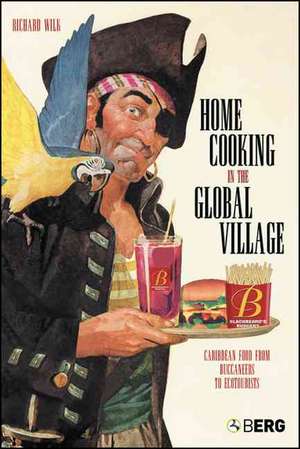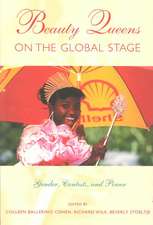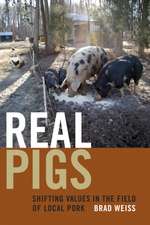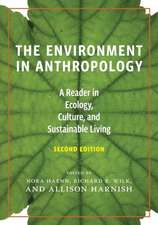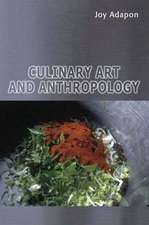Home Cooking in the Global Village: Caribbean Food from Buccaneers to Ecotourists
Autor Richard Wilken Limba Engleză Hardback – 31 ian 2006
| Toate formatele și edițiile | Preț | Express |
|---|---|---|
| Paperback (1) | 219.57 lei 3-5 săpt. | |
| Bloomsbury Publishing – 31 ian 2006 | 219.57 lei 3-5 săpt. | |
| Hardback (1) | 774.70 lei 6-8 săpt. | |
| Bloomsbury Publishing – 31 ian 2006 | 774.70 lei 6-8 săpt. |
Preț: 774.70 lei
Preț vechi: 990.99 lei
-22% Nou
Puncte Express: 1162
Preț estimativ în valută:
148.33€ • 154.46$ • 123.07£
148.33€ • 154.46$ • 123.07£
Carte tipărită la comandă
Livrare economică 14-28 februarie
Preluare comenzi: 021 569.72.76
Specificații
ISBN-13: 9781845203597
ISBN-10: 1845203593
Pagini: 288
Ilustrații: 30 b&w illustrations, bibliography, index
Dimensiuni: 172 x 244 x 22 mm
Greutate: 0.57 kg
Ediția:English.
Editura: Bloomsbury Publishing
Colecția Berg Publishers
Locul publicării:London, United Kingdom
ISBN-10: 1845203593
Pagini: 288
Ilustrații: 30 b&w illustrations, bibliography, index
Dimensiuni: 172 x 244 x 22 mm
Greutate: 0.57 kg
Ediția:English.
Editura: Bloomsbury Publishing
Colecția Berg Publishers
Locul publicării:London, United Kingdom
Caracteristici
Also available in paperback, 9781845203603 £16.99 (February, 2006)
Notă biografică
Richard Wilk is Professor of Anthropology and Gender Studies, Indiana University.
Cuprins
Chapter 1: THE GLOBAL SUPERMARKETFast Food Planet?Thinking More Clearly about GlobalizationThe Caribbean at the Vanguard of GlobalizationA Radical ProposalWhy Start in Belize?Chapter 2: GLOBALIZATION THROUGH FOODFood as a way to Understand GlobalizationMy First Taste of BelizeA Long Global HistoryRECIPE: Creole BunsChapter 3: PIRATES AND BAYMENBuccaneers at the River BaliseThe Buccaneer DietWere the Buccaneers Farmers?A Taste for Fish and FatDrinking MenRECIPE: SalamagundyChapter 4: SLAVES AND MASTERS AT TABLETrade and EmpireConflict, Dislocation and SlaverySlave SocietySlave FoodGlobalization at the MarginsOut of Diversity, A Common CultureRECIPE: Pork and DoughboysChapter 5: THE TASTE OF COLONIALISMMigrants and their Ethnic StewsRacism on the MenuSpicing up the Colonial PotRum, Dancing, and Sexual PleasureLuxuries and RewardsGlobal Food in Barrels and BottlesRECIPE: Saltfish and PlantainsChapter 6: GLOBAL INGREDIENTS AND LOCAL PRODUCTSMaking and Mixing Local FoodCreoles in the KitchenRecipes for a New CuisineClass Boundaries and the Meaning of FoodEthnic Lumps in a Creole StewRECIPE: Chicken TacarryChapter 7: FOOD POLITICS AND THE MAKING OF A NATIONProblems that Wont Go AwayWhy Cant Belize Feed Itself?The Real Problem is Global, Not LocalNational Thinking in a Global WorldWhat is a Poor Country to Do?Food on the Political BattlefieldRECIPE: Winter Fruit SaladChapter 8: MIGRANTS, TOURISTS AND NEW BELIZEAN CUISINEA New Kind of GlobalizationPost-Colonial CookbooksThe Legacy of Colonialism: Cultural AmbivalenceThe Royal Rat: Building Pride in Local FoodMigration and the Return of the Belizean-AmericansThe Peace Corps and MoreAuthentic and Natural, with a Touch of Thai: Cruise Ships and EcotouristsNouvelle Belizean Cuisine and Roots FoodRECIPE: Chilled Canteloupe Soup, Cayo Cuban SandwichesChapter 9: FAST FOOD OR HOME COOKINGA World of Fast Food Nations?Variety on the Menu in the Global VillageBiodiversity And CulidiversityHome CookingRecipe: Rice and Beans
Recenzii
Home Cooking in the Global Village is an outstanding example of contemporary anthropology. It offers a good balance between ethnographic and historical information. With its compelling presentation on the effects of globalization, this book is ideal for courses on Latin America or the Caribbean. As the book considers the role of food, any course on the anthropology of food would benefit from it as well.
What a marvellous book this is ... If you have any interest in globalization, consumerism, the Caribbean, or food, this is a must-read book.
This book represents a good introductory text. The clarity of its discussion and the links between chapters make it a useful resource for undergraduate students.
A fresh anthropological insight into the perils of globalization.
It's without a doubt the best thing I've read on globalization.
What a marvellous book this is ... If you have any interest in globalization, consumerism, the Caribbean, or food, this is a must-read book.
This book represents a good introductory text. The clarity of its discussion and the links between chapters make it a useful resource for undergraduate students.
A fresh anthropological insight into the perils of globalization.
It's without a doubt the best thing I've read on globalization.
